Ivory Coast. The Port of Abidjan faces stiff competition from other regional hubs.
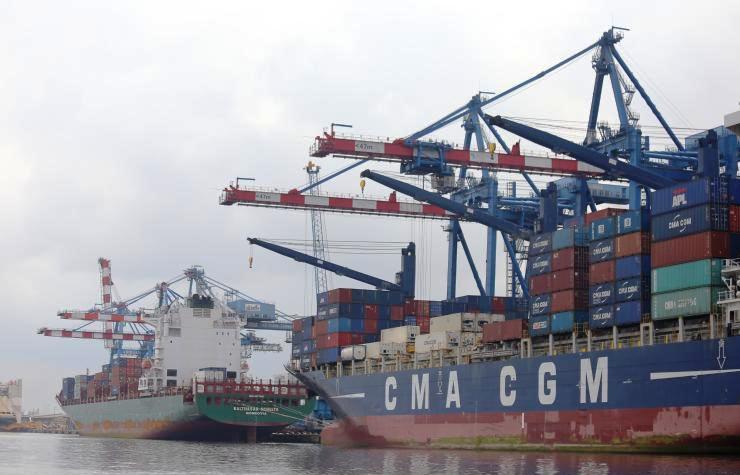
The first port in West Africa, faces a number of challenges: logistical and political, as well as fierce competition from rival ports
in the region.
In a continent where, during the colonial period, the main economic activities were concentrated on the coasts in order to evacuate Africa’s raw materials to Europe, the ports have acquired a strategic importance. This is the case of Abidjan, the first port in West Africa, ahead of Apapa and Tin Can Island in Nigeria, and the second on the continent after Durban in South Africa, with a total bulk cargo traffic of 28 million tonnes and 804,000 twenty-foot equivalent units (TEU) in 2022.
The Autonomous Port of Abidjan is a state-owned company that provides public services and operates the port infrastructure, which is also the country’s main economic hub. Over 90% of its traffic is domestic. More than 85% of Ivory Coast’s total trade passes through the Port of Abidjan, generating 75% of total customs revenues, while the industries in and around the port represent 50% of the national total and provide 55,000 direct and indirect jobs.
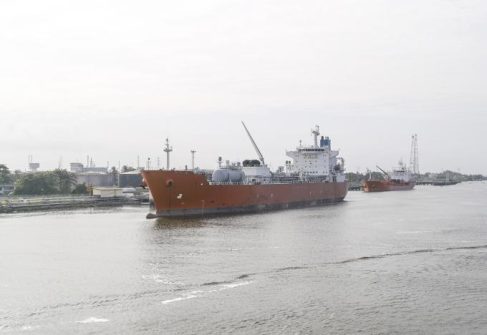
Chemical tanker in Abidjan port. Shutterstock/ Leonardo Viti
The port hosts refineries, shipyards, a fruit terminal with a capacity of 250,000 tonnes/year and a seafood terminal with a capacity of 600,000 tonnes/year, including 250,000 tonnes/year of tuna. The port also has an oil terminal, a grain terminal with a capacity of 300,000 tonnes per year and a mineral terminal with a capacity of 15,000 tonnes per day.
The port of Abidjan is also an important regional hub. In the first half of 2023, 8.5 percent of the total traffic concerned the three hinterland countries of Mali, Burkina Faso and Niger, which represents an annual volume of more than 2 million tons.
Its capacity has been raised considerably recently with the inauguration since 2021 of a roll on – roll off terminal and of a new containers terminal raising its capacity from 1 million to 2.5 m. TEU.
The port can now accommodate container ships of the third generation with a minimum capacity of 14,000 TEU. In 2019, the 2.7 km long and 370 meters wide Vridi canal which connects the port of Abidjan to the Atlantic Ocean was broadened to allow the passage of vessels with a draught of 16 meters.
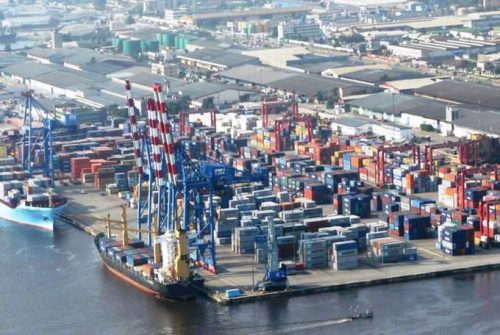
The port can now accommodate container ships of the third generation with a minimum capacity of 14,000 TEU. CCBY-SA 4.0/ Port autonome d’Abidjan Autorité, PAA
In 2020, the China Harbour Engineering Company (CHEC), completed the expansion project of the port which began in 2015 and represented a total investment of $933.4 m. It includes three new container berths, a ro-ro berth, general cargo berth and shipping channels, to improve the cargo handling volume of Abidjan Port.This project is part of the list of Chinese investments in 46 African ports, mainly in East African and in the Gulf of Guina. Concerning Abidjan, such Chinese investment is not surprising since Asia is the first trade partner of the port, accounting 36% of the total in 2021 according to the Autonomous Port of Abidjan (PAA), ahead of Europe (27,8%) namely Turkey, Spain, Belgium and France in that order while Africa accounts for 20% of the total, with the Nigerian port of Forcados as the main partner of Abidjan.
Burkina-Faso represents the largest part of the transit traffic with hinterland countries, while Mali represents the remaining third although it increasingly prefers to use the Guinean corridor to Conakry.
Dry bulk goods account for about two-thirds of traffic and consist mainly of imports for the construction sector (including clinker cement) and rice. Imports and exports of petroleum products account for about 20% of the total, with the remainder being cocoa, cashew nuts and manganese exports.
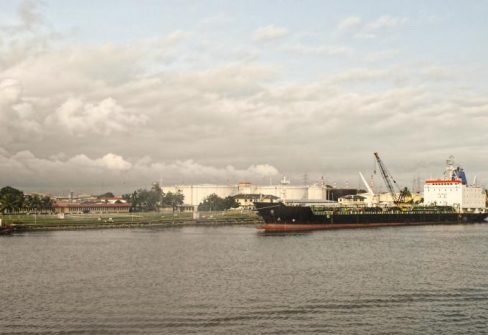
Abidjan port. Abidjan faces also the challenge of long waiting times for the vessels which need to dock there.123rf
The traffic is growing fast. According to the PAA, the volume still increased by 13.5% during the first half of 2023. Further expansion projects are scheduled. In June 2023, a delegation of the Geneva-based Mediterranean Shipping Company (MSC) founded in 1970 by the Italian businessman Gianluigi Aponte met Hien Yacouba Sie the Managing Director of the port, after its recent acquisition in December 2022 of the French Group Bolloré Africa Logistics. Bolloré which had been operating so far the port and is present in 47 countries sold all his African assets to MSC for 5.7 billion euros, explaining that it had been forced to do so because of the increasing competition from Chinese operators.
In the future, MSC plans to finance a barging project which aims at reducing road traffic, congestion in the port and heavy trucks traffic in urban areas. A second project focusses on the improvement of the railway link and to reinforce the service in order to increase the port’s performance. Beside these projects, the management of the Port of Abidjan is planning to build craft dock in the port, with the support of MSC which is also considering to develop cruise tourism in the port of Abidjan. However, a number of challenges need to be overcome to ensure the success of these expansion plans. One of these is insecurity, which can deter consumers from using the infrastructure. Indeed, according to a deputy director of maritime security at the port, theft on ships, at berths and in warehouses is an undeniable reality.
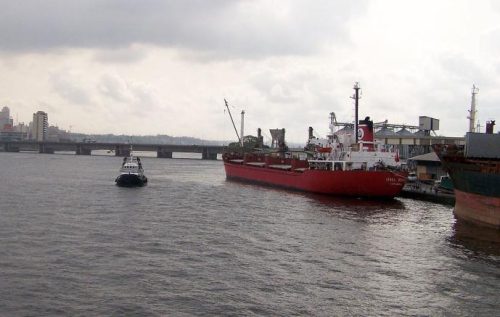
The port of Abidjan is also an important regional hub. CC BY-SA 2.0/ RomainSeaf
The activity of the port may also be affected negatively by other aspects. One of them, a legacy of the civil war of 2011, is that armed robberies are still perpetrated by ex-rebels in the northern part of the country. It is facing an increased threat from terrorism owed to the spillover of jihadist activity from Mali and Burkina Faso. Besides, outside of Abidjan, armed banditry is also a concern along roadways and in rural areas. This situation has justified the establishment of more than 40 police between Abidjan and Ouagadougou. The downside of this deployment has been delays and briberies perpetrated by the policemen at the roadblocks. The activity of the port is impacted by the unrest and the economic slowdown in the three hinterland countries, which is partly caused by the effects ongoing jihadist activities there. As a result, reports the PAA, the traffic with Mali, Burkina-Faso and Niger decreased by 15.7% during the first half of 2023 in comparison with 2022.
The other challenges are logistical. One of the reasons why Malians increasing prefer to truck their imported or exported goods via Conakry in Guinea instead of Abidjan is that the distance is shorter (931 km from Bamako as against 1,116 km between the Malian capital and Abidjan). The alternative of trucking goods to Bouake and load them on the Sitarail train to Abidjan is more time costly.
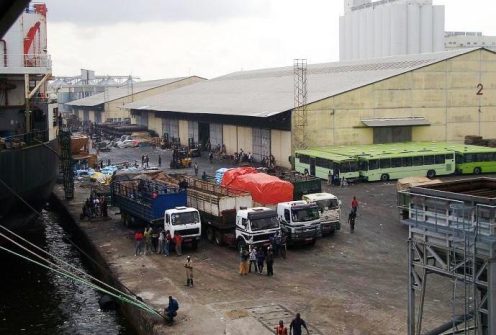
A wharf and warehouses at the Port of Abidjan. CC BY-SA 2.0/ Romain Seaf
The proximity of the city of Abidjan represents a physical limit to the development of the harbour itself. When the trucks arrive to the port main entrance gate truck drivers usually park on both sides of the road, creating terrible traffic jams.
The port of Abidjan is also involved in a war between with other regional hubs such as the Togolese port of Lome and the Ghanaian port of Tema which compete to attract transshipment traffic. A comparative advantage of Lome is that the activity is less congested there. The competition is particularly fierce for the container traffic. In 2021, its volume was 1.2 million TEU for Nigeria and Togo, 1 million for Ghana and almost 900,000 for Côte d’Ivoire. In order to capture the leadership, huge investments have been made with the construction of the 1.5 million TEU TC2 terminal in Abidjan, the Lekki terminal in Nigeria (2.7 m.) and the Tema terminal (3.5 m.) in Ghana, reports the Paris-based consultant OKAN ACF. But the risk of this war of hubs is that it could lead to an overcapacity of all these regional containers terminals.
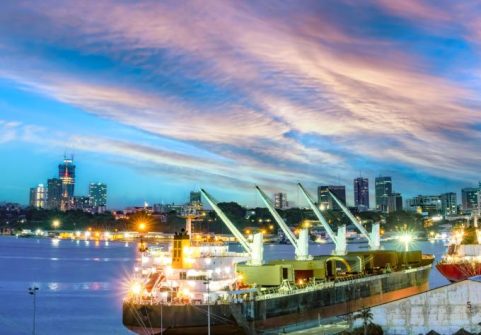
View of the harbor of the port city of Abidjan at dusk. iStock/ Leamus
In the competition with the other hubs, Abidjan faces also the challenge of long waiting times for the vessels which need to dock there. The vessels wait in average two or four days against less than one day in Lomé, Apapa and Dakar, according to a 2022 report from the AP Moller Maersk shipping company. Abidjan is also reported as lagging behind Conakry, Tema, Dakar, Monrovia, Onne, Tin Can Island and Cotonou in a performance ranking released in 2022 by the World Bank and S&P Global Market Intelligence. (Open Photo: Container ships and several transport infrastructures at Abidjan Port. Shutterstock/Boulenger Xavier)
François Misser



